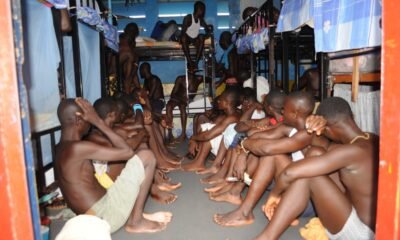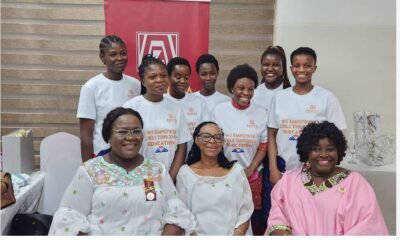News
Della Sowah thanks people of Kpando for successful Father’s Day Cooking Contest

Member of Parliament for Kpando, Della Sowah has expressed appreciation to the people of Kpando for a successful Father’s Day Cooking Contest.
The event was Della Sowah way of extending her deepest appreciation to the remarkable fathers in the Kpando community.
According to her, their unwavering commitment, wisdom, and love leave an indelible mark on the lives of their children.
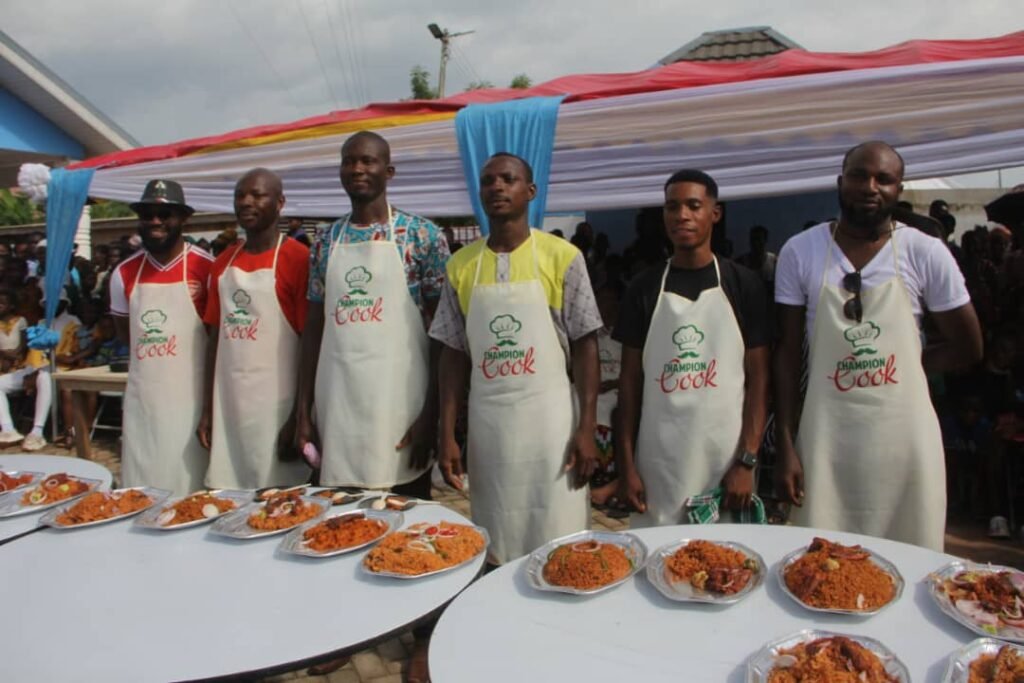
Commemorating International Father’s Day, the took place at the forecourt of Akpini Radio starting from 11 a.m.
Speaking to thespectatoronline.com, she said, the event was very successful, adding that it was an extraordinary showcase of talent, flavor, as well as friendly competition between nearly 50 fathers.
She said, “It was a joyful day that brought families and the community together, celebrating the talents and passion of fathers in the kitchen.”
She added that “It was a true testament to the power of food and the bonds it creates.”
Interestingly, the winner will go home with GH₵1,000 in addition to a gas stove and other souvenirs.
Two other winners, the first and second runners-up, were rewarded with GH₵ 500 in addition to a table-top cooker and GH₵ 200 plus a rice cooker, respectively.
Additionally, those who placed 4th and 5th were also rewarded.
By Edem Mensah-Tsotorme
News
Rural Midwife Angela Tsrakasu’s unwavering commitment to provision of maternal healthcare
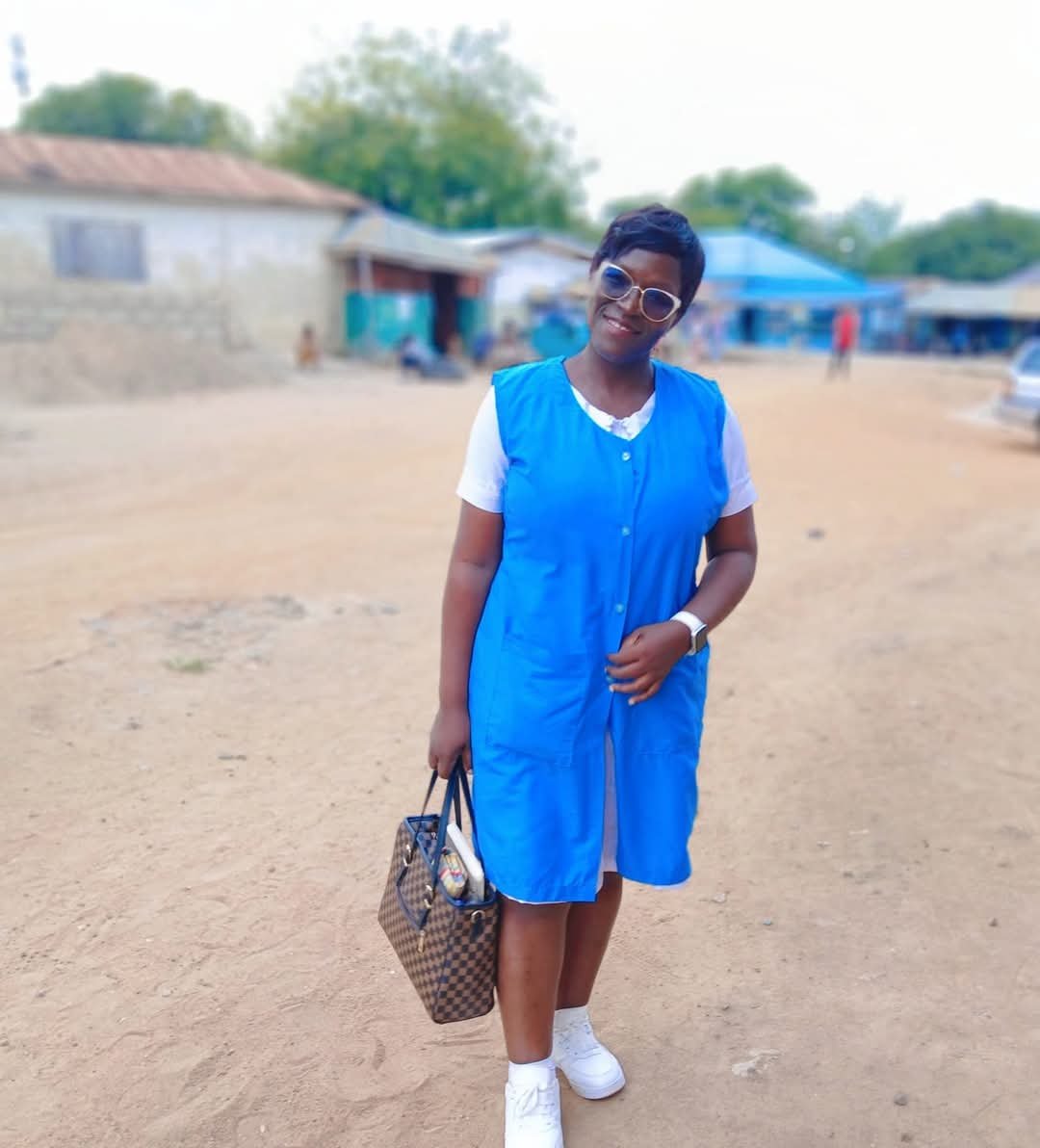
With a passion for providing quality maternal healthcare in deprived communities, Angela Yayra Tsrakasu has become a trusted and beloved figure in the lives of countless women and families.
With over 16 years’ experience and a good understanding of community nursing, Angela has developed a unique approach to midwifery.
Her dedication, expertise and kindness have earned her the respect and admiration of the community she serves.
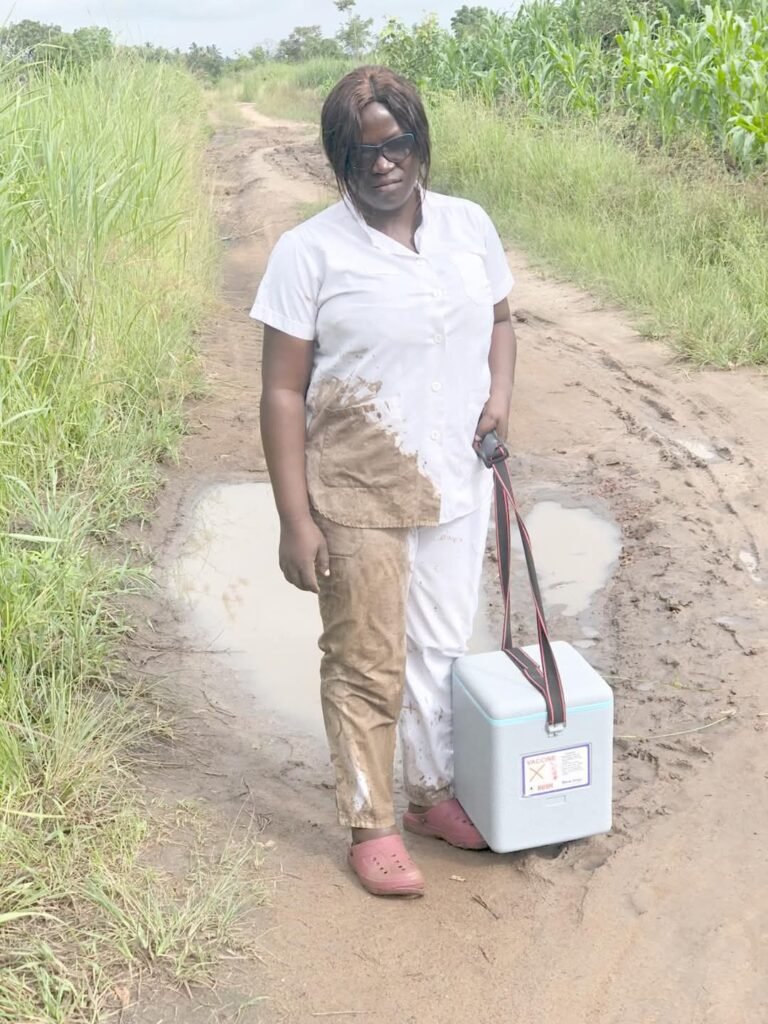
Her journey into midwifery began as a community health nurse for five years before enrolling at Pantang Nursing and Midwifery Training School where she became a midwife after completion.
After completion, she said “I had the privilege of working in various communities with different ethnic groups, providing primary health care and supporting those in need, not only in my catchment area.
Speaking to The Spectator in Accra on Tuesday, Angela said her work as a midwife includes providing prenatal, intrapartum and postpartum care to women in the rural communities.
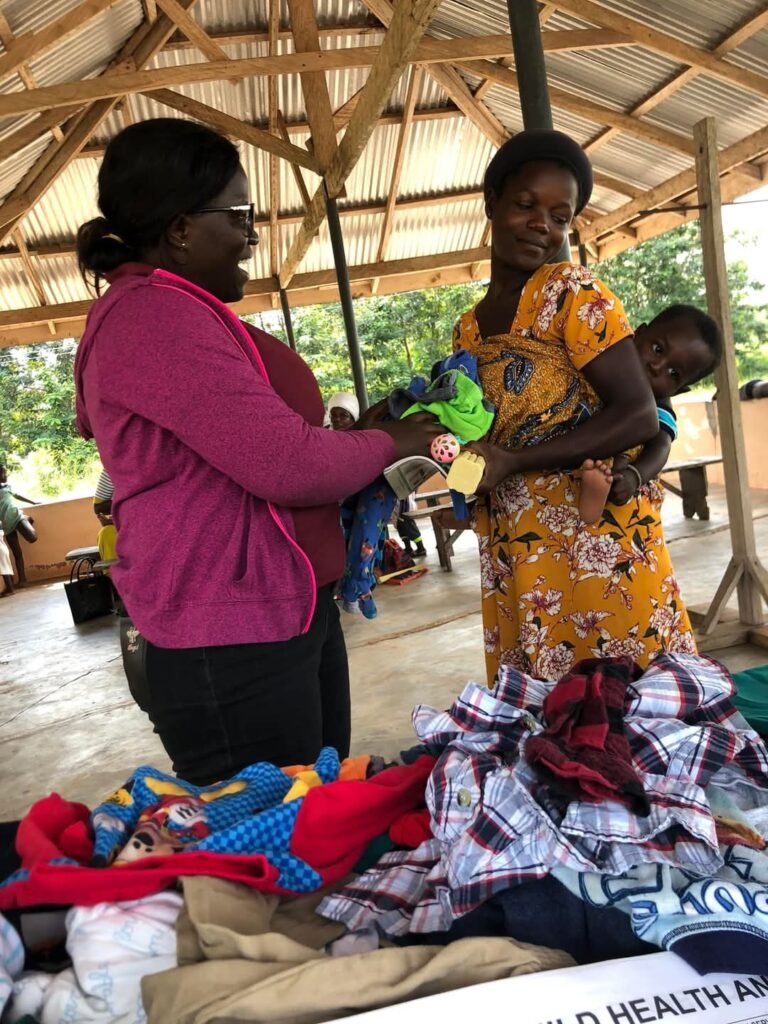
“I love working in these settings; it allows me to build strong relationships with women and families I care for,” she said beaming with smiles.
Currently, Angela is stationed at Avevi, a rural community in the Akatsi North District of the Volta region.
Describing the community as a remote rural area, which according to her is about an hour drive from the nearest town, she is most often challenged by the limited access to medical resources, poor road network, and limited access to portable water as well as poor network services.
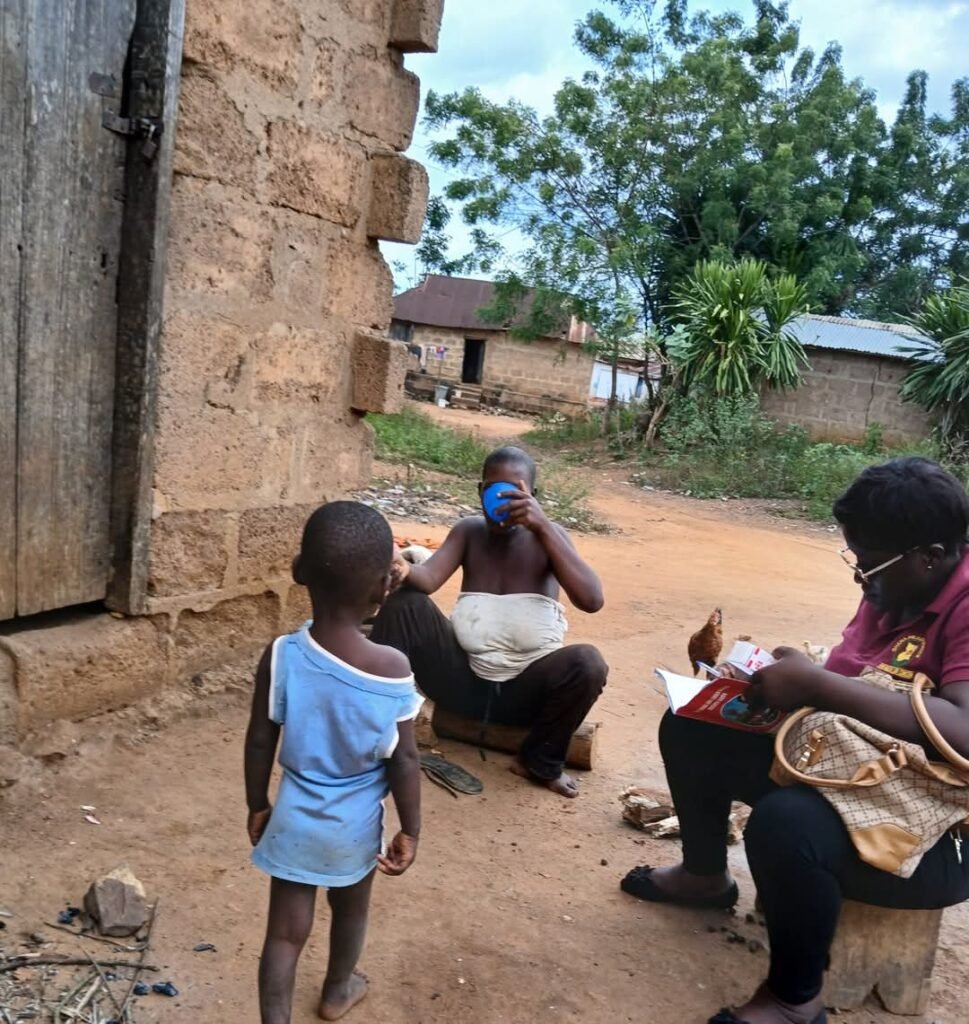
Narrating an ordeal with the poor road network, Angela recounted a journey to attend to a pregnant woman, in one of the remote villages in her catchment area on a rainy day.
She said “the road was so slippery and I lost my footing. Thankfully, I was the one who fell, not the pregnant woman. That would have resulted in some complications.”
Thoughts of that incident, she said always come with mixed reactions and emotions.
She would ask herself “why me? My colleagues are in the cities are taking same salaries like me yet they don’t go through all these challenges. Why remain here and keep stressing myself?”
Then I would again ask myself, “what if the pregnant woman was in labour, would it have resulted in some complications, would she have survived?
She said at least I had a vaccine carrier to support her if anything had happened to her.
“But after weighing all these thoughts, I was happy, I was the one who fell. Though I felt a bit embarrassed, thankfully, there was no one around. It was only the motor rider and I. I got up and moved on to accomplish what I had set up to do,” she added.
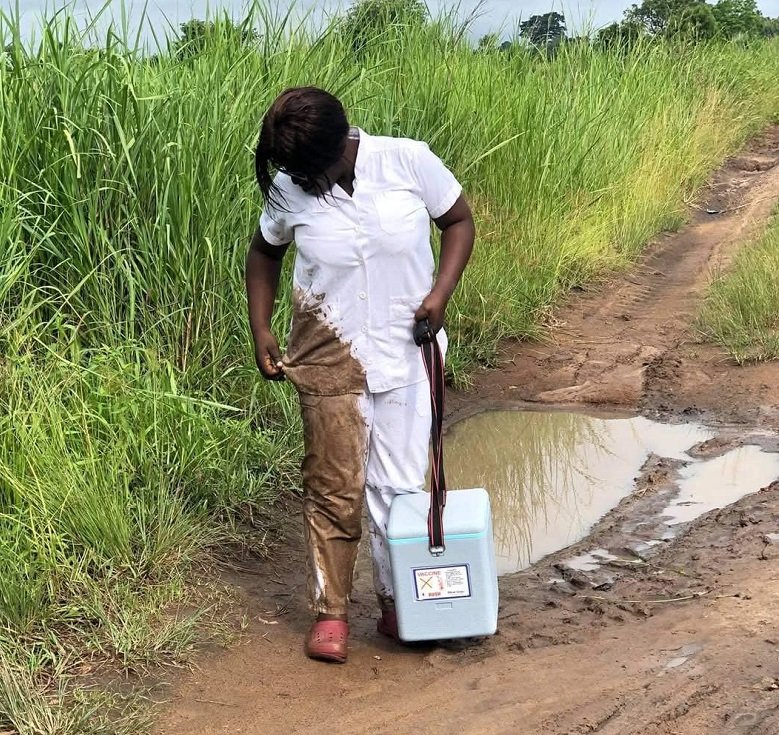
She mentioned that the incident was a humbling experience for her and always reminds her of the importance of adaptability and the joy in helping save a life.
Angela’s day begins early with a quick review of her day’s schedule, checks her bag to ensure all the necessary equipment and supplies, including her midwifery kit, fetal monitoring equipment, and emergency supplies were intact.
She then meets up with pregnant women scheduled for the day and also follows up on those who defaulted, visit those whose delivery dates were due, new mothers, and their families.
She also provides prenatal care, conduct check-ups, and offer health education on topics like nutrition, hygiene, and childbirth preparation.
“These visits allow me to assess their health and well-being in the comfort of their own homes,” Angela said.
“As a midwife, I am always on call for emergencies and births. I may receive a call to attend a birth, provide emergency care for a complication, or transport a patient to a higher-level facility,” she said.
After a long day, I take some time to debrief and reflect on my experiences. I update my records, document any challenges or successes, and plan for the next day.
According Angela, with the help of family and friends and the power of social media, she has been able to support nursing mothers and some vulnerable individuals within and outside her catchment area.
She said so far she and her friends and family members have been able to donate school bags, exercise books, shoes, uniforms, food stuff, detergents, sanitary pads, clothing and other essentials to the less privileged in several communities.
Angela says her motivation stems from the desire to support women and families and see the joy on the faces of downtrodden and the many ‘God bless you, thank you’ she receives on daily basis.
“They mean so much to me; they give me an inner satisfaction and peace,” she stated.
Midwifery, she said is a powerful tool for her to connect with other midwives, share knowledge and resources, call for help as well as advocate maternal and child health in rural communities.
She urged young people desirous of becoming nurses to know that nursing is not just a job, but a calling to serve others and have a positive impact on the world, adding that the profession was a challenging but rewarding one which requires compassion, empathy and dedication.
Angela has so far been posted to three facilities with at least 15 communities under each facility and she enjoys reading and watching documentaries at her spare time.
By Jemima Esinam Kuatsinu
News
Don’t insert foreign material into vagina
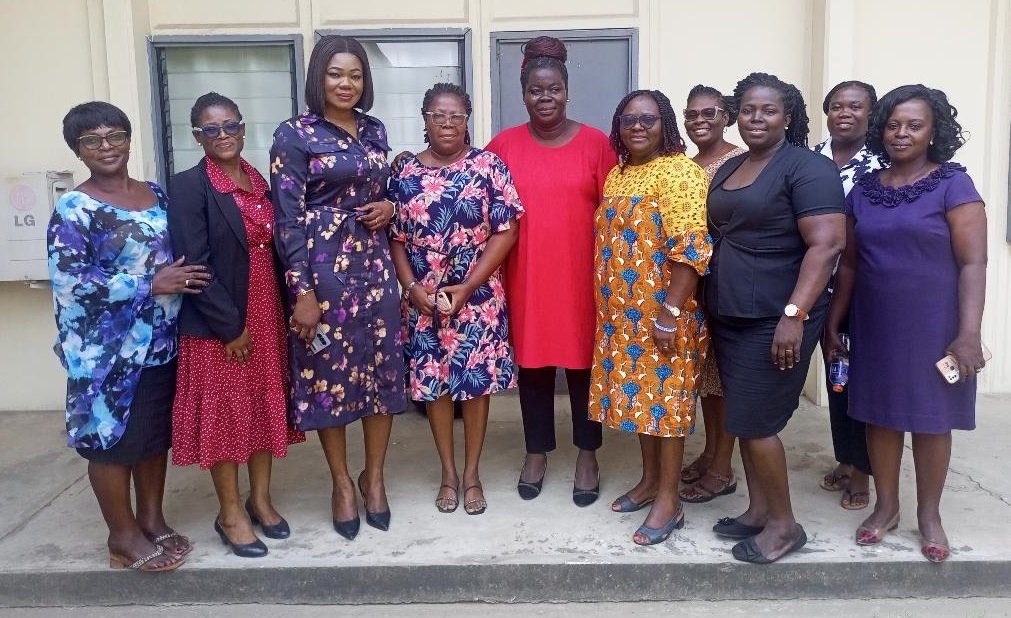
A Health expert has expressed concern about the nature of health issues that confronts women in adulthood and has since advised them to help themselves by prioritising vaginal health.
According to the Acting Programmes Manager of the Non-Communicable Diseases (NCDs) at the Ghana Health Service (GHS), Dr Mary Efua Commey, most of the issues that affect women were caused by some negative practices they indulge in at youthful ages.
Those practices, according to her lead to serious health implications and urged them to desist from them.
For instance, the insertion of foreign objects into the private parts was something women must avoid.
Dr Mary Efua Commey gave the caution last week during an interactive session with female staff of the New Times Corporation (Times Ladies) aimed to create awareness on cervical cancer, and the need to vaccinate and screen girls and women.
According to Dr Commey, some women insert white clay, popularly known as ‘ayilo’, naphthalene balls (camphor), cloves (pepre), herbs, vagina tightening creams and many other things into their private parts.
But in response to that, she told the women to “leave the vagina alone; use tap water to wash it, don’t insert your finger into the vagina.”
She underlined that the vagina naturally cleanses itself, hence, there was no need to use soap and other detergents to clean it.
Dr Commey explained that the position of the cervix makes it easier to trap infections, a situation that might create problems, adding that, “let us not create new problems because you don’t know how your body will react to these chemicals.”
According to Dr Commey, women were expected to be screened once every three years but most sexually active women do not get screened after all.
She mentioned that one of the reasons some women shy away from screening was because they do not have the permission of their husbands.
Furthermore, she recounted a few instances where some men acts as impediment on the way of their wives because they do not understand what it means for their wives to be screened for cervical cancer.
She said the death rate for cervical cancer was unacceptably high as the GHS was trying to reduce the number.
She again indicated that over 3,000 cases of cervical cancer was recorded every year with more than half death cases.
Dr Commey mentioned that screening rate among women in Ghana was extremely low with only 3.6 per cent women screening for the disease in 2023.
Moreover, mentioning some of the risk factors of the disease, she said women with family history, multiple sex partners, personal history of abnormal screening results, women with persistent HPV infection, and smoking were prone to it.
She said signs and symptoms of cervical cancer include bleeding during or after sex or between periods, post-menopausal bleeding, unusual vaginal discharge, pain during sex and lower back pain.
By Jemima Esinam Kuatsinu


